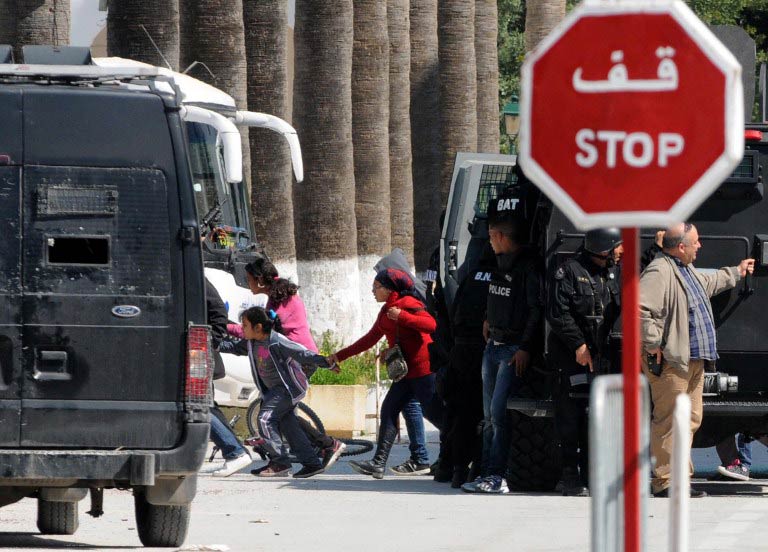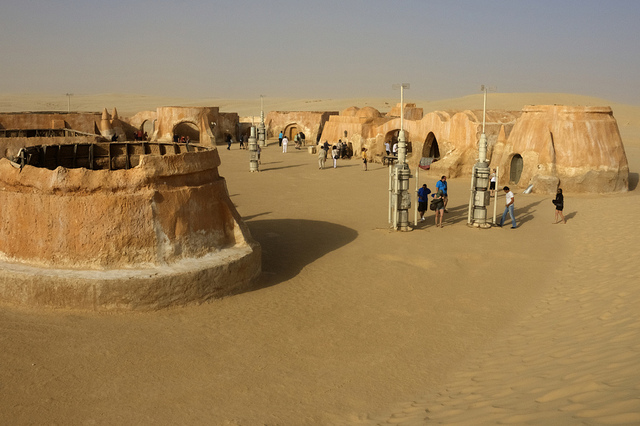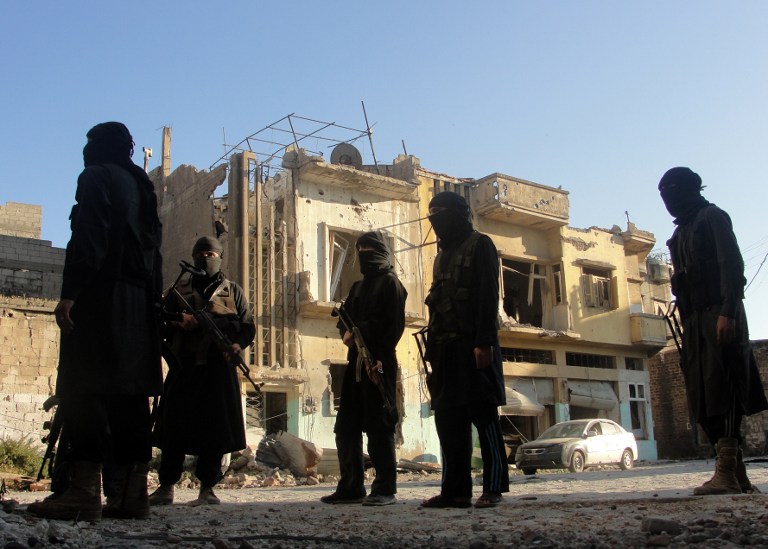
Crouched against a wall in the Bardo museum, Fabienne, a French tourist, hid with her guide and 40 French holidaymakers, fearing they would be discovered by the gunmen who had burst in to take the Tunis museum of ancient treasures and its tourists hostage. Whispering, she told French TV station BFMTV by phone: “We’re all terrified … we’re afraid they’ll appear and suddenly kill us all.”
Tunisia, the small north African country which lit the first spark of the Arab spring when its popular uprising toppled the dictatorship four years ago, has been plunged into shock after gunmen killed at least 20 people, including at least 17 foreign tourists, in the worst terrorist attack in more than a decade.
The targeting of tourists by terrorists is a new phenomenon in Tunisia and a massive blow to a country whose struggling post-revolution economy depends largely on its beach resorts and foreign visitors. Tunisia, which peacefully elected a new Parliament in December, has prided itself as a model of political transition since the overthrow of the brutal authoritarian Zine El Abidine Ben Ali in 2011, in contrast to the post-revolutionary difficulties of its troubled neighbours.
But it has also been struggling to tackle the growing terrorist threat in the region and thousands of Tunisians have left to fight foreign jihad. The attack immediately raised questions about the Islamist terrorist threat to Tunisia amid mounting anxiety that jihadi violence is spilling over the border from neighbouring Libya, as well as Algeria.
Three Italians as well as visitors from Germany, Poland and Spain were among the dead, as well as a Tunisian cleaner and a security officer. Around 22 other foreigners were wounded.
Bardo museum
The attack began just after midday as gunmen armed with kalashnikovs opened fire in front of the Bardo museum, the country’s largest and a major tourist attraction, which houses one of the world’s biggest collections of Roman mosaics and is built in a 19th century palace adjacent to parliament.
As the gunmen struck, tourists were getting out of coaches to visit the museum on a spring day that had seen scores of visitors, many from cruise ships docked in the port for the day.
Wafel Bouzi, a guide with a Spanish-speaking group, told journalists that on exiting the museum with his group, he saw in the car park “a young 25-year-old man, dressed normally, without a beard” who was holding a kalashnikov. “I thought he was playing with it. Then he opened fire.”
The gunmen began shooting near the coaches then entered the museum where hundreds of panicked visitors had taken refuge. Josep Lluís Cusidó, mayor of the small Catalan town of Vallmoll, was at the museum as part of a wedding anniversary trip with his wife. “A few men walked in and started shooting, we’re alive thanks to a miracle,” he told the Spanish news agency Efe. “These men suddenly started shooting and people started falling to the ground dead and things started falling from the ceiling … Everything happened so fast. Right now we’re with the police. It’s total chaos.”
Tunisian security forces entered the museum and shot dead two gunmen at about 3pm local time (1400 GMT). MPs had been in parliament nearby debating new laws which were to include an anti-terrorism bill. After the shots began, the parliament session was suspended and MPs were evacuated. The tourists were also later ushered out of the museum as security officials warned at least two or three accomplices of the gunmen might be at large.
More than 100 European tourists freed at the end of the siege were driven out of the museum gates, their faces showing a mixture of anxiety and relief. The mixture of men and women, young and old, stared out into space, some giving smiles at crowds still packed outside the gates.
One young blonde woman inside the first bus grinned and waved her hand. Dozens of armed police and troops remained inside the museum complex sealed off from the city. One Italian couple celebrating their 50th wedding anniversary on a cruise ship told the Italian newspaper La Stampa how fellow holidaymakers had been rushed from the museum back to the ship. “All of a sudden we saw them all rushing back on board. There was panic among those who had managed to get away from the terrorists,” the newspaper quoted them as telling a friend.
Several hundred Tunisians gathered around the museum gates. Relief that the ordeal was over was mixed with dismay among those watching. “This is a black day for Tunisia,” said Karim Ben Sa’a, a manager in the tourism industry. “We are very sad for these tourists. They visit our country and it is so, so sad to see them die. Our hearts are black.”
There was shock that terrorists had managed to launch an attack at the very heart of the capital. Police set up checkpoints and a policeman with a machine gun was posted outside the office of the UK’s British Council.
“There is a possibility, but it is not certain, that [the two gunmen] could have been helped … and we are currently conducting extensive search operations to identify the two or three terrorists who possibly participated in the operation,” the prime minister, Habib Essid, said.
The president, Beji Caid Essebsi – the 88-year-old secularist elected in December after serving in previous Tunisian regimes – visited survivors in hospital, saying: “The authorities have taken all measures to ensure that such things don’t happen.”
Worst attack since 2002
The museum assault was the worst attack involving foreigners in Tunisia since an al-Qaeda suicide bombing on a synagogue killed 21 people on the island of Djerba in 2002.
The French foreign minister, Laurent Fabius, said: “It is not by chance that today’s terrorism affects a country that represents hope for the Arab world. The hope for peace, the hope for stability, the hope for democracy. This hope must live on.”
The attack came the day after Tunisia announced arrests of a jihadi group trying to infiltrate the country, and in the week a key Tunisian militant was killed in Sirte. Troops are deployed on the Libyan border to stop suspected terrorist groups bringing in men and equipment.
There have also been concerns about the Mount Chaambi area on the border with Algeria where al-Qaeda in the Islamic Maghreb has reportedly been helping a Tunisian group that has killed numerous soldiers.
Although the country has been more stable than others in the region, a disproportionately large number of Tunisian recruits – some 3 000, according to government estimates – have joined Islamic State (Isis) fighters in Syria and Iraq, triggering fears some will return to mount attacks back home.
The American embassy in Tunis was attacked in September 2012, seriously damaging the embassy grounds and an adjoining American school. Four assailants were killed. Overall, though, the violence that Tunisia has seen in recent years has been largely focused on security forces, not foreigners or tourist sites.
In 2013, two opposition figures were assassinated in Tunis and, in what is believed to be the first suicide bombing in Tunisia , a man walked off the beach in the resort town of Sousse and blew himself up in front of a seaside hotel. He was the only fatality.
Philip Stack, of British risk analyst Maplecroft, said of the Tunis events: “This attack is certain to have an effect on the tourism industry, which the authorities have worked hard to rebuild after the 2011 revolution. The principal targets of terrorism in Tunisia in the last couple of years have been the security forces. By targeting foreign tourists at a prestigious city centre site, the terrorists have changed their tactics and raised the stakes.”
The US secretary of state, John Kerry, said Washington condemned the attack and continued “to support the Tunisian government’s efforts to advance a secure, prosperous, and democratic Tunisia”.
It was not immediately clear who was behind the attack.
The EU’s foreign policy chief, Federica Mogherini, blamed Isis, saying in a statement: “With the attack that has struck Tunis today, the Daesh [Isis’s Arabic acronym] terrorist organisation is once again targeting the countries and peoples of the Mediterranean region.
“This strengthens our determination to cooperate more closely with our partners to confront the terrorist threat. The EU is determined to mobilise all the tools it has to fully support Tunisia in the fight against terrorism and reforming the security sector.”
Additional reporting by Ashifa Kassam





